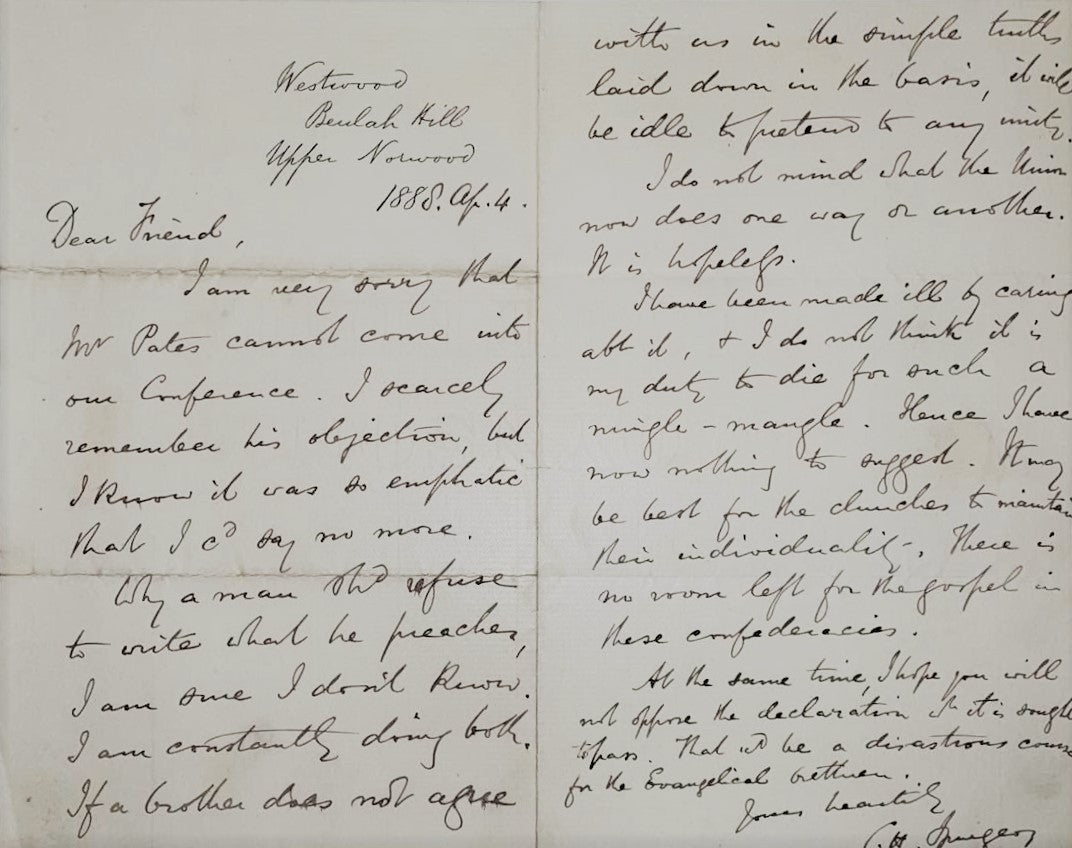Specs Fine Books
1888 C. H. SPURGEON. Spurgeon Becomes Non-Denominational! Downgrade Controversy. Unpublished ALS.
1888 C. H. SPURGEON. Spurgeon Becomes Non-Denominational! Downgrade Controversy. Unpublished ALS.
Couldn't load pickup availability
This is a very historically important letter from C. H. Spurgeon, written just previous to the final Conference of Baptists where Spurgeon and others would attempt and fail to bridge the gaps between conservative and liberal Baptists . . . after which Spurgeon would officially submit his letter of withdrawal from the Baptist Union over the Downgrade Controversy.
Spurgeon here is transparently weary and already internally making his move toward independency even in advance of the last-ditch effort at reconciliation held on April 23, 1888.
During the Downgrade Controversy, Spurgeon took his stand against modernism, liberalism, and compromise of Scripture and the Atonement rising in the Baptist Union. But it cost him emotionally and in health. His discouragement is evident here. His wife would later indicate her belief that the Controversy was what ultimately led to his decline in health and untimely death.
The Controversy among the Baptists flared in 1887 with Spurgeon's first "Down-grade" article, published in The Sword & the Trowel. In the ensuing "Downgrade Controversy," the Metropolitan Tabernacle disaffiliated from the Baptist Union, making Spurgeon's congregation as the world's largest independent church. Spurgeon framed the controversy in this way:
Believers in Christ's atonement are now in declared union with those who make light of it; believers in Holy Scripture are in confederacy with those who deny plenary inspiration; those who hold evangelical doctrine are in open alliance with those who call the fall a fable, who deny the personality of the Holy Ghost, who call justification by faith immoral, and hold that there is another probation after death... It is our solemn conviction that there should be no pretense of fellowship. Fellowship with known and vital error is participation in sin.
The Controversy took its name from Spurgeon's use of the term "Downgrade" to describe certain other Baptists' outlook toward the Bible (i.e., they had "downgraded" the Bible and the principle of sola scriptura). Spurgeon alleged that an incremental creeping of the Graf-Wellhausen hypothesis, Darwin's theory of evolution, and other concepts were weakening the Baptist Union. Spurgeon emphatically decried the doctrine that resulted:
"Assuredly the New Theology can do no good towards God or man; it, has no adaptation for it. If it were preached for a thousand years by all the most earnest men of the school, it would never renew a soul, nor overcome pride in a single human heart."
"Westwood
Beulah Hill
Upper Norwood
1888, April 4
Dear Friend,
I am very sorry that Mr. Pates [Charles Pates] cannot come into our Conference. I scarcely remember his objection, but I know it was so emphatic that I could say no more.
Why a man should refuse to write what he preaches, I am sure I don't know. I am constantly doing both. If a brother does not agree with us in the simple truths laid down in the basis, it will be idle to pretend to any unity.
I do not mind what the Union now does one way or another. It is hopeless.
I have been made ill by caring about it, and I do not thing it is my duty to die for such a mingle-mangle. Hence I now have nothing to suggest. It may be best for the churches to maintain their individuality. There is no room left for the Gospel in these confederacies.
At the same time, I hope you will not oppose the declaration which it is sought to pass. That would be a disastrous course for the Evangelical brethren.
Yours heartily,
C. H. Spurgeon"
2pp. Very clean and bright. Folds as usual. Signature slightly off edge. Not "clipped," but organic to the original.
Please note this item is presently awaiting import license and will therefore be subject to delayed delivery.
Share


